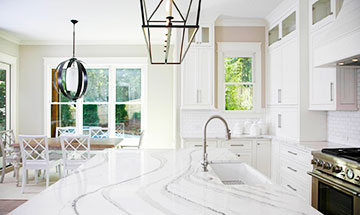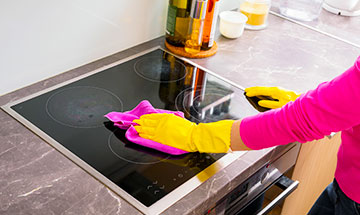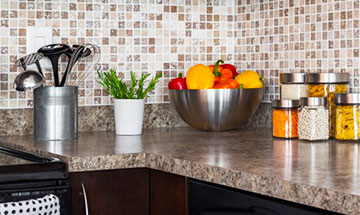Contents
This Is What Happens When You Use Oven Cleaner On Countertops

Keeping the kitchen clean is essential. As long as you use mild home ingredients for cleaning, there is not much of a problem. However, when you use store-bought cleaners, you are using several strong chemicals. These are tough on the grime and make cleaning much more uncomplicated. Take a strong oven cleaner, for example- this is loaded with agents that can react differently on different surfaces. If you use such strong ones on the modern kitchen countertops, you would be doing more harm than good. Why should you stop using such products outside of the recommendations? What happens when you use them on your countertops?
What Is An Oven Cleaner?
It is a unique formula that helps you tackle your stubborn oven grease without spending elbow grease. Apply it and see you’re the appliance sparkly clean in a few quick swipes with the cleaning cloth. The deposition of food particles and the oil that settles on the insides of the baking and grilling chamber are tougher to get rid of that you think. Therefore, a good oven cleaner helps simplify this for you. The use of potent ingredients achieves this. Some of them might even feature a pungent odor that shows their strength. Such cleaners are, therefore, better to skip when it comes to cleaning countertops. The best oven cleaner options can be used in traditional as well as convection ovens.
What Are The Most Common Chemicals Found In Oven Cleaners?

Have you noticed warning messages that you should avoid contact with the skin in most of the products in this range? This is mainly because of the strong chemical composition of these cleaning agents. Some are so strong that they can cause burns. Thurefore, it is a good idea to wear heavy-duty protective gloves while handling these products. Here are some common contents in the ingredient list of these products:
- Sodium hydroxide You would have heard the common names that are used for this ingredient, ‘lye’ or ‘caustic soda.’ It is quite commonly used in a variety of applications. In diluted form, it is found in soaps and can be purchased even in the supermarkets in most places. The real problem comes when this lye comes in contact with water. This is when extreme heat is produced, and it can burn the skin.
- Butane This flammable substance helps break the carbon and soot deposited on the grime inside the stove chambers.
- Ethers These are used in solvents, and even in some pesticides. It can cause severe irritation and injure the cornea when it comes in contact with the eyes.
- Monoethanolamine This highly volatile ingredient is used as an accelerator. It plays a crucial role in removing greasy deposits. Inhaling, this is potentially dangerous for both animals and human beings. When it comes in contact with the eye, it can lead to partial blindness.
- Diethanolamine This one leads to irritation of the nose and throat on inhaling it. Irritation occurs when it comes in contact with the skin.
Along with this, other components are also present, and the manufacturers never disclose the complete list. Laden with so many chemicals which can be fatal when swallowed and significantly hazardous when inhaled, these are unfit for use on the countertops. Whether it is to knead the dough quickly or to chop vegetables, there are many situations where edible items might come in direct contact with the countertops.
Is There A Green Oven Cleaner Alternative?
Many modern appliances come with a self-cleaning feature. However, for all the gunk that accumulates inside this kitchen appliance, you need an efficient cleaning product. The popular oven cleaners are all harmful to humans using them, and the fumes can also pollute the air. Therefore, here is a simple green alternative to try.
Make a paste of baking soda and water. Apply it liberally on the insides of the appliance and let it sit for half a day. Wipe off the dried baking soda with a wet cloth and scrape off the excess. Spray a little vinegar and give it a finishing touch to see your appliance sparkle like new.
What Is The Effect Of Oven Cleaner On Kitchen Countertops?

As the effect of oven cleaner on kitchen countertops can be damaging, how to clean kitchen countertops the safe way? How to remove stains from countertop without damaging the surface or affecting its aesthetics? It would be easier to answer these questions by talking about what this product can do on kitchen counter types.
Wooden Surfaces

You should cover flooring and counters made of wood with a protective film before using these cleaning products. This product can stain wood even if a small amount sprays or spills on to the wood. The varnish on the wooden surface, which gives it the sheen would react with the cleaning product. This then strips off the varnish, and there is nothing but a sticky residue left behind. In the worst cases if you allow stronger contact, then the material can eat through the wood and cause it to peel off. The caustic nature of the product is one of the reasons for this effect.
Stone
These cleaners are quite aggressive when they come in contact. Using them on stone surfaces or granite countertops is a very bad idea. Most types of stone surfaces are sealed with Polyurethane. The lye in these cleaners can strip away paint and even damage the outer surface and the sealing. This reduces the life of the counter and dampens its looks. Most of the stone kitchen top setups are made of marble or even polished granite or quartz. This is one of the most durable choices for kitchen work areas. Oven cleaning products cause severe damage to these surfaces, mainly in terms of aesthetics. They leave nasty stains or even remove that luster of these surfaces permanently.
Stainless Steel

Most manufacturers who are popular in the oven cleaning sector do not recommend using their products on stainless steel surfaces. Whether it is the sink or even for stainless steel grills, it is better to avoid contact with these cleaners. The damage might happen due to accidental sprays or even when you place your oven grill with the cleaner sprayed, to rest near a stainless steel sink. If your appliances have a stainless steel finish, you need to be even more cautious. It can lead to discoloring of the surfaces and permanently damage the outer polish as well.
Tile
With tile surfaces, the damage is similar to that on granite — looks are broken. The shiny outer surface gets ruptured. The cleaning products also affect the grouting between tiles and at the edges. The discoloration is one of the most common effects of tiles coming contact with these strong cleaning agents.
Formica
Discoloration or darkening is prone to occur if you accidentally spill or spray these harsh appliance cleaning solutions on to a Formica kitchen counter. Known to be a rugged material, this one can withstand severe damage when you wipe off and wash the surface at once. However, the visible damage to the looks cannot be reversed.

The kitchen work surface is one of the most conspicuous details. Therefore, any kind of destruction to the beauty of it can affect the overall looks to a great extent. Therefore, use only mild counter cleaner products for best results. You can even whip up an all-purpose disinfecting solution with vinegar, water, and essential oils of your choice. These are products that are safe to use without a mask. You would also not have to worry about skin contact while using them or run for grabbing your gloves. To top it all, such natural cleaners can help preserve the finish of the surfaces and keep them looking as good as new. Therefore, you would have a spotless cooking area which also continues to look like new for several years.
A Final Word
Stop using an oven cleaner on kitchen countertops right now, if you do not want to harm those expensive work surfaces, tiles and glass. These cleaners are good for the cleaning of the respective appliances that the manufacturer recommends in the labels. Always adhere to the usage instructions and wear protective gear like gloves, goggles, and mask to keep yourself safe. Use a good kitchen counter cleaner to clean the kitchen work surface. Use milder kitchen ingredients for cleaning the appliances as well as the counters. This can reduce the need for using harsh cleaners in the long run. Check out mykitchenadvisor for more such tips on cleaning your kitchen and appliances.








COMMENTS
15 January, 2020
You completed certain good points there. I did a search on the topic and found a good number of persons will agree with your blog.